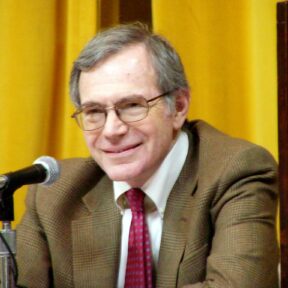
Eric Foner
Overview
* Communist apologist and professor of history at Columbia University
* Of 9/11 and the Bush administration’s response, Foner stated, “I’m not sure which is more frightening: the horror that engulfed New York City or the apocalyptic rhetoric emanating daily from the [Bush] White House.”
* Nephew of Communist Party labor historian Philip Foner and Communist SEIU organizer Moe Foner
Born in February 1943 in New York City, Columbia University history professor Eric Foner is widely considered one of the foremost professionals in his field. He is a former President of both professional historical associations and is regarded as academia’s leading expert on the Reconstruction period, the tumultuous era that followed the Civil War. Professor Foner was raised in a notable Communist family. His uncle Philip Foner was the Communist Party’s official labor historian. Another uncle, Moe Foner, was a Communist labor activist with the Service Employees International Union.
Eric Foner was an anti-American 1960s radical, and as a historian is an apologist for American Communism. On October 4, 2001 he contributed to a London Review of Books symposium of reactions to the 9/11 atrocity. In that piece, Foner focused not on the attack itself but on what he perceived to be the threat of an American response:
“I write this in an ominous lull between the talk of vengeance and vengeance itself. The moment any such retribution is sought with bombs and guns will be the moment for the mobilisation of anti-war forces all over the world … [Terror] merely enhances and exaggerates the feeling among exploited people that the matter of protest has to be left to a few martyrs. And just as the signs were growing of a renewed confidence in the world anti-capitalist movement, the attention of the world’s leaders is focused on a single, dreadful act that gives them the excuse they need to gun the engines of oppression.”
Of the Bush administration’s response to 9/11, Foner stated, “I’m not sure which is more frightening: the horror that engulfed New York City or the apocalyptic rhetoric emanating daily from the White House.”
In March 2003, as American forces entered Iraq to overthrow the Saddam Hussein dictatorship, Professor Foner participated in an anti-war “teach in” at Columbia University, where he invoked Communist Party icon Paul Robeson as a model of patriotism. “I refuse to cede the definition of American patriotism to George W. Bush,” Foner declared. “I have a different definition of patriotism, which comes from Paul Robeson: ‘The patriot is the person who is never satisfied with his country.’” (Foner had been preceded on the podium by fellow Columbia professor Nicholas De Genova.)
In Professor Foner’s view, foreign hostility toward the United States is warranted by America’s historical record. “A study of our history in its international context,” he wrote in a September 2002 editorial in The Nation, “might help to explain why there is widespread fear outside our borders that the war on terrorism is motivated in part by the desire to impose a Pax Americana in a grossly unequal world.” Rather than dwelling on the Islamist persuasion of the 9/11 attackers, Foner called for Americans to bear in mind that “our society has produced its own home-grown terrorists.”
In a September 2004 article for the History News Network, Foner wrote that anti-U.S. sentiment was “based primarily on American policies — toward Israel, the Palestinians, oil supplies, the region’s corrupt and authoritarian regimes, and, most recently, Iraq.” Nor were citizens living under the yoke of oppressive governments less free than those enjoying the freedoms of Western civilization, said Foner. Instead, he claimed, they “have their own historically developed definitions of freedom and ways of thinking about the social order, which may not exactly match ours.” Foner even suggested that they may be more free, spared as they are the “profoundly destabilizing” aspects of the free market. Besides, Foner added, American freedoms had been “significantly weakened since the September 11 attacks.”
In a lengthy review of Professor Foner’s academic work, the liberal intellectual historian John Diggins wrote, “Foner … is both an unabashed apologist for the Soviet system and an unforgiving historian of America.” Foner’s 1999 history of the United States, The Story of American Freedom, was caustically dismissed by historian Theodore Draper, who called it a work more accurately described as “the story of unfreedom.” Writing in the New York Review of Books, Draper characterized Foner as “a partisan of radical sects and opinions” seeking “to rehabilitate American Communism.” “From [Foner’s] account,” wrote Draper, “it would be hard to understand why so many millions of immigrants should have come to the United States for more freedom.”
In 2005, Foner — along with such luminaries as Michael Posner and Henry Louis Gates — served as an advisor to the International Freedom Center (IFC), which played a leading role in determining how to proceed with the construction of a World Trade Center Memorial at Ground Zero in New York. (Other key players influencing the IFC project included billionaire funder George Soros and ACLU Executive Director Anthony Romero.) Instead of a tribute to the victims of terror or the heroes of 9/11, the IFC — which received funding and support from such sources as the Open Society Institute, Human Rights First, and the ACLU — planned “a high-tech, multimedia tutorial about man’s inhumanity to man, from Native American genocide to the lynchings and cross-burnings of the Jim Crow South.” Due to public outrage, New York Governor George Pataki removed the proposed IFC project from plans for the World Trade Center Memorial in September 2005.